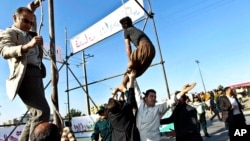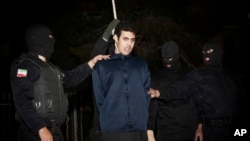A human rights expert has condemned Iran’s excessive use of the death penalty, especially for juvenile offenders, and is calling for a moratorium on the government’s use of capital punishment.
Ahmed Shaheed, the special U.N. investigator on human rights in Iran, said he is appalled at the high number of executions in Iran. Last year, he said, nearly 1,000 people were executed, the highest number in two decades.
Shaheed, whose expert findings will be debated at the U.N. Human Rights Council in Geneva, said he is alarmed by the ongoing practice of executing juvenile offenders, a procedure that is prohibited under international law. Over the past decade, he said at least 73 minors under age 18 were put to death. He said 16 of them reportedly were executed in 2014 and 2015, the highest figure for five years.
“Iran’s penal code explicitly retains the death penalty for boys as young as 15 lunar years of age and girls as young as nine lunar years for certain crimes such as murder, adultery and sodomy…The number of juvenile executions has increased, not decreased, in the two last years,” he said.
In his report, Shaheed said Iran’s criminal justice system violates the legal rights of its citizens and denies them a fair trial. He said he continues to receive frequent and alarming reports about people being detained for long periods without access to lawyers and subject to torture and ill treatment. He said prisoners are routinely tortured to obtain confessions that are then used as evidence in court.
The report also documents the ongoing abuse of the Bahai religious community. It says the Bahai are harassed and intimidated. They are denied the right to higher education and employment. Many of the community’s leaders are imprisoned.
Shaheed has been investigating Iran’s human rights record for the past five years. He said the government has never allowed him to visit the country. His mandate comes up for renewal at this session of the human rights council. As in previous years, Shaheed said he expects Iran to try to abolish this position. He said Iran lobbies hard for this to happen. He said that is because Iran, unlike a country like North Korea, cares about its reputation and does not want its human rights record to be displayed before the whole world.









